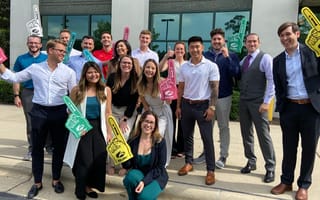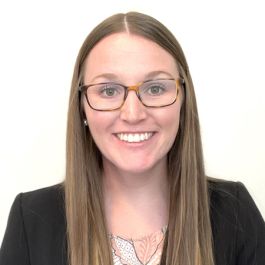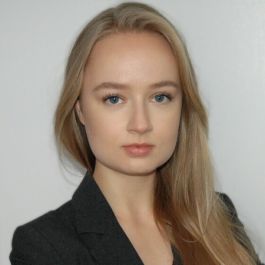If you’re serious about a career in tech sales, look closely at the company you’re joining.
For many, becoming a sales development representative (SDR) is the gateway to learning the skills required to move into more senior roles. And while any SaaS company could fill seats with warm bodies and hand SDRs a script to recite on calls, that’s not the most effective path toward company success, or tangible professional development for talent.
“Where you accept your first SDR role can determine your future and set you up for the rest of your career,” McKenzie Spease, an SDR manager, said. “That’s why it’s so important to be at a company with a proven track record of success, promotions and talented leaders who can help you grow internally or even move to other big, exciting companies down the road.”
For Spease, she’s found such a company in Zscaler. Founded in 2007, Zscaler has quickly become a leader in the cybersecurity space through its security cloud platform. To date, the organization has helped over 5,600 customers — including 35 percent of Fortune 500 companies — pivot away from legacy security models in favor of cloud-based services instead.
As cloud solutions become increasingly important to how companies do business, security offerings have had to evolve. In a world where bad people can hack into hospital ventilator systems and shut them off, or access a bank’s private data like Social Security numbers, platforms like Zscaler are critical in protecting organizations and their customers. But according to SDR Bobby Grant, this work isn’t just a promising market opportunity. It’s a chance to make a significant impact.
“For so long, the pinnacle sales role might have been selling medical devices for example,” Grant said. “But now that technology has become the forefront of society, cybersecurity is an incredibly important product. There’s a new gold standard for what a sales job can be, and it’s cybersecurity.”
But selling Zscaler’s platform isn’t easy — cybersecurity is complex in nature, and tailoring messaging to companies across industries can’t be handled with a quick templated email. The critical nature of security is something prospects take seriously, which can mean multiple in-depth conversations with senior-level prospects. That requires SDRs to have more than a baseline knowledge of their platform.
But that’s what makes the role so rewarding, said Sales Rep Thilde Larsen (former SDR). Being able to work for a company like Zscaler gives SDRs the support and tools they need to become highly successful in their sales careers, or wherever their ambition may lead.
“If you can sell cybersecurity, you can sell anything,” Larsen said. “The training here allows you to understand how different industries operate, what affects different companies daily, and to really empathize with the customer. Those skills benefit you for your entire life — not just professionally, but personally.”
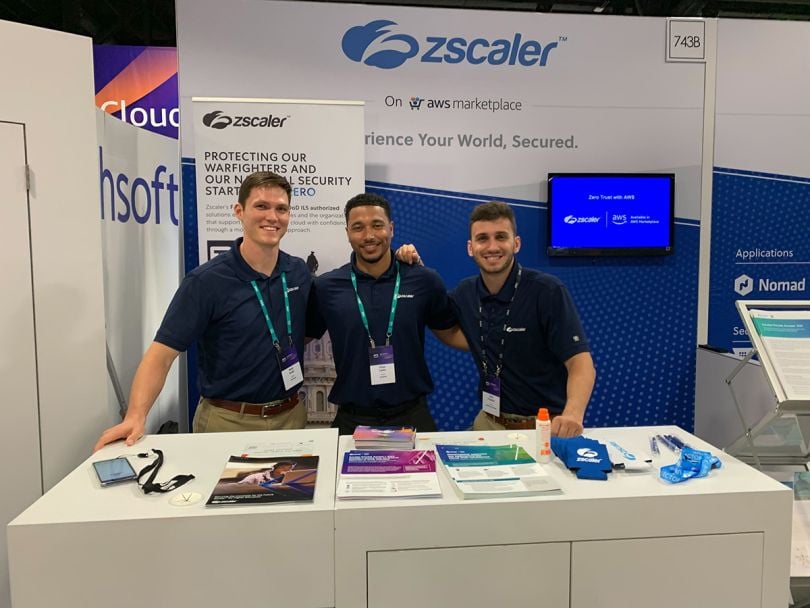
What do you find most exciting about selling Zscaler’s platform?
Sales Rep Thilde Larsen: What’s most exciting to me is that all companies really need cybersecurity solutions. Without them, businesses cannot defend themselves against threats that are becoming increasingly common. Every time I have a meeting with a prospect or current customer, they’re so impressed with what we do, and how we’re different from other cybersecurity companies out there. Zscaler is a leader in the space, which makes it a really exciting time to be here.
SDR Bobby Grant: We have this disruptive technology and platform that, when we show it to customers, they have an “Ah-ha!” moment. That makes it really fun to sell, because you can watch as your prospects realize how many problems we can solve for them and how many pain points we can eliminate.
I didn’t have a tech background when I started at Zscaler. The biggest challenge I ran into was that cybersecurity is so complex, and there are so many intricacies to each company. Every company is making a move to the cloud, so much so that the U.S. government has mandated that all of their critical infrastructure move to cloud-first security. With this transition to the cloud, companies need to secure their users and applications. Being able to convey that to a customer who’s used to legacy tech can be challenging, but it’s up to us to show them that there’s a better way of handling cybersecurity. And we’re trained particularly well here to be able to have those critical conversations.
How do new hires who have never worked in cybersecurity get brought up to speed on the industry?
SDR Manager McKenzie Spease: About a year ago, we saw a need to have more resources dedicated to our team to help with training and onboarding. Since then, we’ve hired quite a few folks who are dedicated solely to the SDR organization who provide training on our products, sales plays and processes, so the team can ramp up in their current and future roles. We also have leaders and tenured SDRs who focus on training our new hires and providing ongoing support.
We also have a “Next Role Fast Start” program that helps people once they’re ready to move on to the next step of their career. Thilde, for example, has moved on to another role through our Sales Fast Start program, which trains people to be full-cycle sellers.
SDR Bobby Grant: The SDR process at Zscaler has very clear guidelines, which helps people ramp up quickly. We’re able to onboard people in around two weeks, whereas most companies might take months for SDRs to get their feet wet before talking to prospects. Zscaler lets you make mistakes early so that you understand the process and make marginal gains daily with your co-workers.
Career Growth at a Glance
- 22 SDRs were promoted in 2021 to roles in sales, renewals, enablement and more
- Industry-low negative attrition on the SDR team, unless talent leaves because of an internal promotion
- 85 percent of the team hits at least 100 percent of quota
- Average quota attainment is 135 percent
What makes an SDR role at Zscaler different from similar roles at other companies?
Sales Rep Thilde Larsen: We’re not given a script that we just need to read to customers. Nobody wants to hear a sales pitch. They want to hear what’s relevant to them. So we learn to do proper research to get real intel on our prospects, gather that information and then come up with messaging that provides value to the customer. Our messages will all be different, depending on the account we’re meeting with. If you don’t understand their problems because you haven’t done enough research, then you can’t help customers or ask the right questions. This actually keeps the job fun and interesting every day!
SDR Manager McKenzie Spease: One thing Zscaler has that I haven’t seen in the industry is a great alignment between SDRs and sales reps. Our SDRs only have one or two teams they have to support, so they can really get ingrained in what a territory is doing and what their priorities are. I’ve been at companies where SDRs support 20 to 50 reps, and there’s just not the bandwidth necessary to do the research and tailored messaging that we have by using a strategic approach and being tight-knit with our sales teams.
We also have so many tools at our disposal that can help us quickly find the best information about our customers, like ZoomInfo, LinkedIn Sales Navigator, LeadIQ and 6Sense. As an organization, we’ve gotten everything we’ve asked for, from prospecting platforms like Outreach and Drift, to gamification tools like Ambition, which makes a lot of our day-to-day work extremely fun and inspiring. We’re interested in using anything that helps streamline the SDR role or automates some of the busy work.
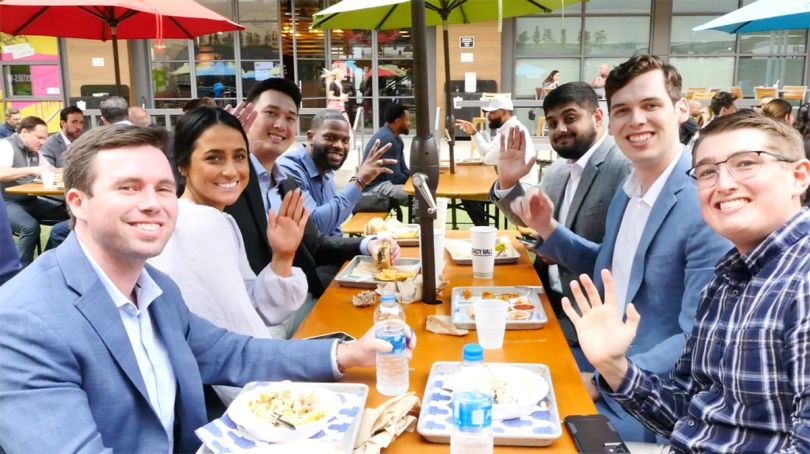
What’s the culture of the sales team like?
Sales Rep Thilde Larsen: The culture at Zscaler really is amazing. It’s a highly motivating environment, and we’re very collaborative as a team. We love to win and help each other out if someone is experiencing a challenge. Our calendars are always open.
SDR Bobby Grant: I always compare my role to my background in athletics, as that’s what I was involved with before joining the company. During a track meet, throwers need to throw as far as they can, sprinters need to run as fast as possible and everyone needs to perform. You can’t win unless everyone does their job correctly.
That reminds me of Zscaler. We all have different territories and different reps we’re working with, and some people work with small companies and other people focus on large ones. But everyone needs to perform well so we can win as a company. Zscaler does a great job of fostering a culture where, even though we all have unique challenges and goals, we’re all working toward the same thing. That’s a great team to be on!
What does career growth for SDRs look like at Zscaler?
Sales Rep Thilde Larsen: Career growth can happen in a lot of ways. You can go the more traditional route, which is what I’ve done, and become a sales rep. But there are other opportunities you can go for too, like joining the customer success team, marketing or sales enablement. The SDR role gives you so many skills that you’ll be able to use in all sorts of roles — it really depends on where you want to go.
SDR Manager McKenzie Spease: I’ve had someone on my team approach me saying they want to create a new role at the company. We figured out what the business case was, and figured out who to talk to. Someone else approached me about a role they were interested in on another team, but I knew very little about it. I set up time to talk with the manager on that team to figure out how I could educate my team member and get them connected with the right people.
I want everyone on my team to be successful, so if they’re not happy in their role, I want to introduce them to the right people they’ll need to network with in order to transition to another team perhaps.
Hunters and Unicorns
What kind of networking opportunities does Zscaler provide? How does that help with career growth?
SDR Manager McKenzie Spease: This industry is very small, so it’s important to have networking connections. We have access to a highly sought-after group of people who have moved on to C-level roles throughout the industry. Knowing that the people who we’re working with today can make impressive moves is motivating.
When you see people who’ve had so much success in turning small companies into unicorns, you trust them. If you want to change companies down the road, you can follow someone from this network and know you’ll be learning from people who’ve had a ton of experience and success. These are people you can make a long-term career with.
